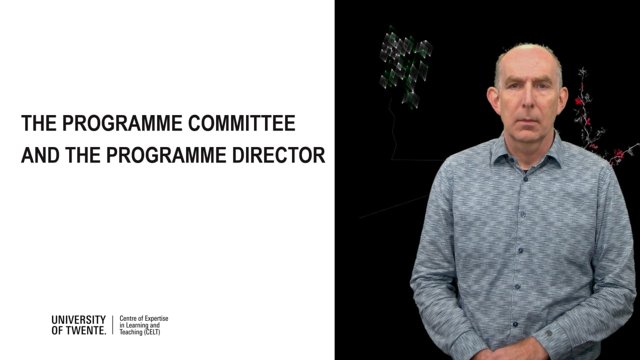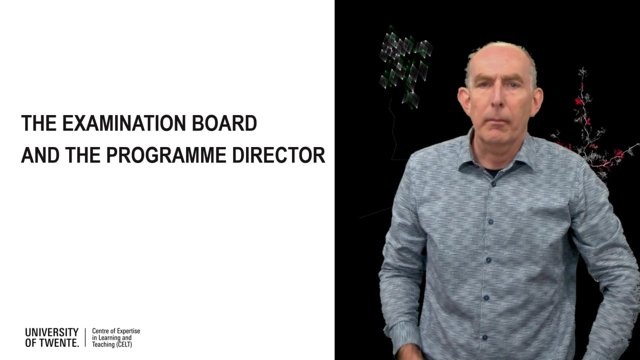Being a Programme Director (PD) at the University of Twente is a challenging task. PD’s have a lot of responsibilities, the most important one being the content and quality of the programme. In addition PDs have an important task in , the management and the marketing of the programme. How exactly you can and should fulfill this role as PD depends on different factors, like the culture in the faculty, the other members of the management team and of course your own background .
To help you fulfil your role as PD in an effective and efficient way, you can use this toolbox. It gives information about relevant topics, and often refers to internal and external professional development opportunities that can help you as a programme director.
- Programme Director as Educational Leader
Part of the role of being a Programme Director is acting as Educational Leader. But what does this mean? At the UT we define this that you:
- have a vision on education, and more specific on education in your programme.
- can motivate the team (teachers, students, support) to contribute to this vision
- translate your vision to (strategic) plans and goals, and can involve the appropriate people to realise these plans
- know about the relevant developments in education at the UT and outside the UT
- stimulate involvement and cooperation between people involved in the programme
If you would like to learn more about and/or develop these competences, the UT has several options for you.
UT internal courses via CTD:
* Academic Leadership
A 2 day course where you will enhance your leadership skills in a practical way. Mostly aimed at professors and associated professors with management and leadership responsibilities.* Influential coaching and effective management
A 5.5 day course with additional intervision meetings, where you will learn how to realize your results without formal leadership responsibilities; furthermore you will learn how to motivate people and make difficult problems negotiable. Mostly aimed at WP and OBP that have coordinating tasks.* Well-being Leadership Development Expedition
A 6 day course, where you will learn to act and reflect on three crucial levels of leadership: lead self, lead others and lead system, with a focus on wellbeing. This course is aimed at people in leadership positions.* Decision Making
A 2 day course where you will learn effective decision making for yourself and in group meetings. This course is aimed at formal and informal leaders of the UT.More info: https://www.utwente.nl/en/ctd/courses/?domain=leadership
Relevant courses via UT network:
* Educational Leadership Programme
An intensive, 14 month programme, organized together with the University of Groningen. You will develop yourself as educational leader, gain a good theoretical and practical foundation in the fields of educational science, change management and educational leadership and will be able to start, design, lead and execute educational projects to improve and innovate education in your programme or faculty. This programme is aimed at academics who have an educational management position or an informal role in educational leadership.
Read more about this programme here.* ECIU Leadership Development Programme
An international intensive programme (3 times a 4-day seminar at three different ECIU partners in Europe) where you will learn how to contribute to innovation and change in leadership. You will reflect on the particular characteristics and challenges of leadership and strategic management in a university context, and will deepen your knowledge of important policy developments and trends in European and global higher education. This programme is aimed at young and future leaders as well as staff members with leadership experience (with a maximum of 5 years in a senior role).
More info: https://www.eciu.org/for-university-staff/leadership-development-programme - Cooperation with the Programme Committee and Examination Board
In this video you can find information on what the tasks and responsibilities of the Programme Committee are, and how you can cooperate with the Programme Committee. In the video some references are included like WHW, art. 9.18. This means article 9.18 of the Dutch Law on Higher Education and Scientific Research, where these tasks and responsibilities are described.

In this video you can find information on the tasks and responsibilities of the Examination Board, and how you as programme director can cooperate with them.

- Everything you need to know about accreditation
Every 6 years each programme has to go through a re-accreditation process: an evaluation process by the NVAO to check whether the programme still meets (or better: exceeds) the minimum quality requirements for an academic programme. This re-accreditation is compulsory: without it the programme will not be funded by the Dutch Ministry of Education. For some PDs it is the upcoming most important task, other PDs might not even get to deal with. Whatever situation is applicable to you, below you can find all relevant information regarding re-accreditation
For more information about accrediation and your role as PD in this process:
- Visit the acccreditation website for more general information: https://www.utwente.nl/en/intranet/accreditations/
- Join the online course about accreditation, specifically for programme directors: https://canvas.utwente.nl/enroll/7JRJYD
- Learn from each other: the PD community
A good way to learn about being a programme director is by talking with other programme directors about their experiences. To facilitate this we organise PD meetings 4 times a year. Every meeting has a topic that is chosen by a small agenda setting group of programme directors. Besides this topic, there will also be room for informal exchange of your experiences as a PD.
You will automatically be invited for these meetings.
- Guidance and coaching
Being a PD is a challenging task. It can at sometimes be a bit overwhelming, especially when you have just started, or you might run into questions you have never had to deal with before. In such situations it could be helpful to have the opportunity to discuss your questions with someone. We have several options for this:
- One of our CELT colleguaes can visit you to help you with questions related to your development and educational issues
- We can link you to a more experienced Programme Director, in the role of a mentor.
If you are interested in this, please contact us.
If you need guidance in your career development, the UT also offers one on one coaching. On this website: https://www.utwente.nl/en/hr/my-career/ you can read about the possibilites. The advisors at the Career Development Centre would be more than willing to have a personal advisory meeting with you to discuss the possible steps to move forward in your career or development.
- Kick-off for new Programme Directors
For new programme directors (1 year or shorter) we organise a 'kick-off' to meet each other and discuss UT specific topics, such as how to tackle an accreditation or work together with the programme committee and examination board. The kick-off is a small interactive session, together with a more experienced PD and with a lot of room for exchanging experiences and questions. If you are interested to join this session, please let us know.
- Work with your education team
Though you are not always the supervisor of the teachers within your programme, you have an important role in leading the team to a common goal: providing good quality education in your programme. It might be challenging to keep everybody in your team on the same page. The following tips might be helpful:
Expedition Education
For educational staff who are new in education at the UT, CELT created an 'Expedition Education'. It's an online Canvas page that guides you trough al the aspects of education at the UT, from vision to quality assurance and from supervising to using Osiris. If you want your new teachers to be well informed, encourage them to enroll: https://canvas.utwente.nl/enroll/A37GWTRecognizing and Rewarding Teaching
At UT, we want to recognise and reward everybody's talent and stimulate personal talent development. For all people within UT: scientists, teachers, support staff, and students. Our amibition is to ensure that employees are not only assessed on their individual performance, but also on their impact and contribution they make to the team. The UT teaching framework is one of the tools aimed to provide qualitative and in-depth evaluation and recognition of the teaching achievements of all academic staff.Community
Several programme directors invest in creating a feeling of community within the teacher team of the programme. For example, they organise lunchmeetings or education days. This can help you as PD as, besides community building, it also gives you the opportunity to hear the teachers’ ideas and opinion on the programme, and you can discuss your vision and plans on education - Online courses (Good Habitz & Future Learn)
As a PD your schedule will probably be very full. Following a course in your own time and pace could me more convenient for you. The UT offers courses via 2 existing platforms. Both platforms offer courses on topics that might be relevant for your. For example:
- Managing Expectations
- Networking
- Change management
- How to delegate
- Privacy/AVG
- Blended Learning Essentials
- Introducing Assessment for Learning
- Innovation Management
- Collaborative working in a remote team
- Communication and Interpersonal Skills at Work
- Contact
Do you have questions or remarks about the professionalisation options for PD's? Or do you have ideas for this toolbox? Please contact us.
ir. F.M.J.W. van den Berg (Frank)Senior Educational Consultant - trainer
